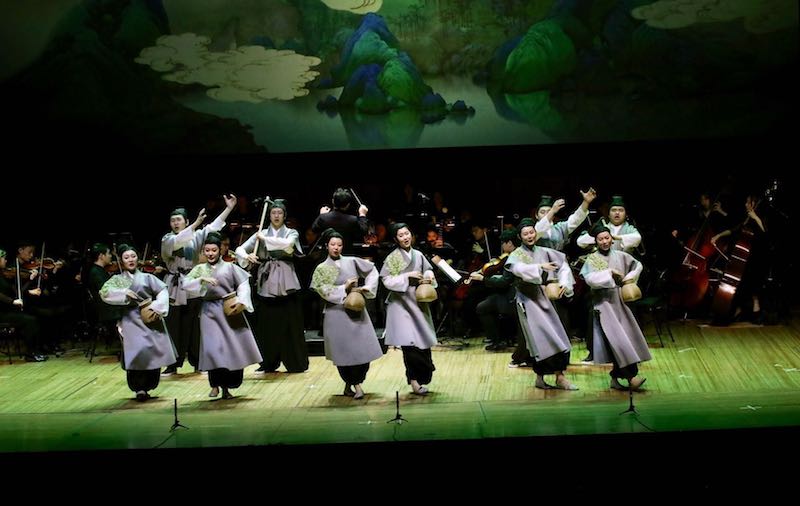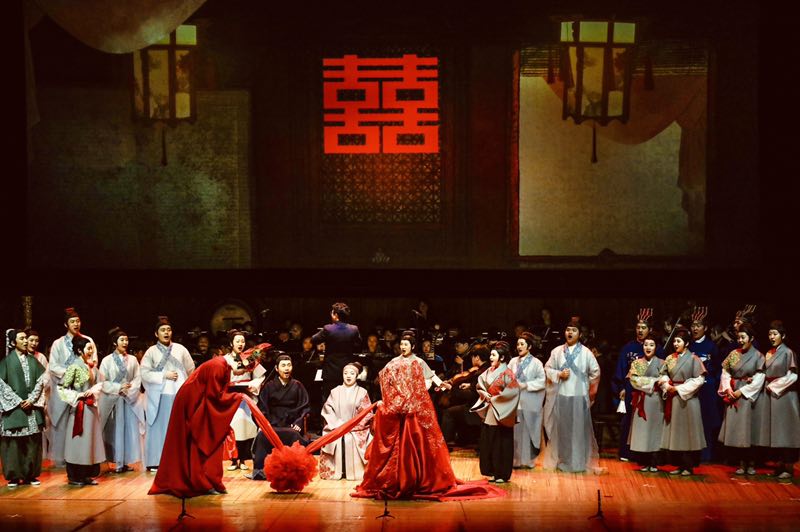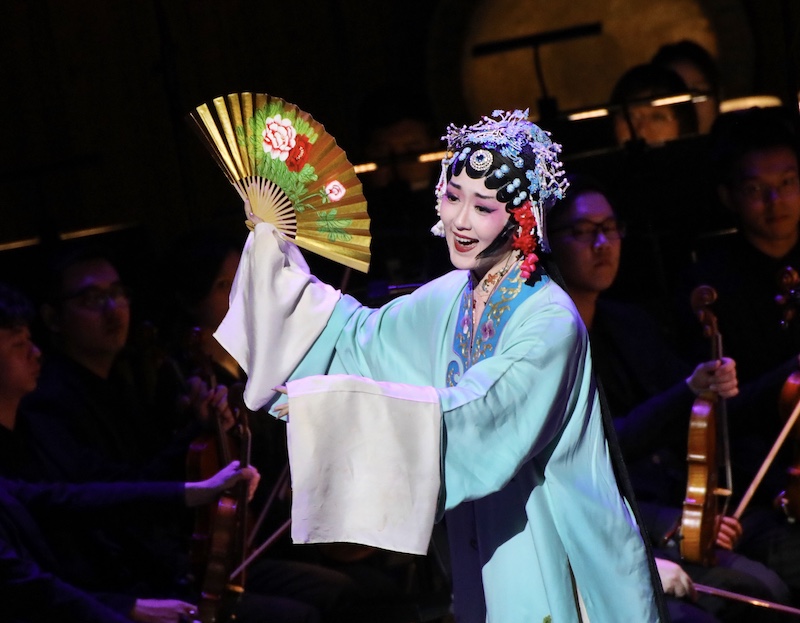Tang Xianzu was a Chinese author, but more notably a playwright of the Ming Dynasty. His humanistic ideals and the generational overlap between him and his more renowned Western counterpart, with whom he was an almost exact contemporary, earned him the cognomen Shakespeare of the East.
 Tang Xianzu the Playwright in Concert. Photographs courtesy of Ausfeng Events
Tang Xianzu the Playwright in Concert. Photographs courtesy of Ausfeng Events
This original opera is a recreation of Tang’s otherwise unknown life. It offered vignettes of the major events in his life by showcasing his unswerving ideals in morality and belief in “everlasting love”. Its debut marks a first of its kind in both China and Australia. In modern language, his personality would be described as naively honest, and the way he resurfaced from the grief of losing his wife early, which directly led to his downfall in the political scene, is a path that all males born in educated families at that time strived to follow. Weaved seamlessly into these moments were modern adaptations of Tang’s plays. However, these were sparse and mainly focussed on two of the four Linchuan Dreams – Zi Chai Ji (The Purple Hairpin) and Mu Dan Ting (The Peony Pavilion).
Also marking a first in this performance was the Shanghai Conservatory’s Symphony Orchestra and Opera debut in Australia. The music for all three acts, overture and epilogue was beautifully orchestrated and composed by Xu Jianqiang. It was very much a modern score with film-like harmonic progressions, which made it highly accessible to modern audiences, while simultaneously integrating traditional instruments in an equally accessible and modern way – a feat very successfully delivered.
Musically speaking, however, fast runs in the strings were occasionally blurred and intonation in the brass not always clean. There were also frequent moments where singer and orchestra were not in sync, but these moments were always quickly and smoothly resolved by the conductor, Zhou Ke.
 Tang Xianzu the Playwright in Concert. Photograph courtesy of Ausfeng Events
Tang Xianzu the Playwright in Concert. Photograph courtesy of Ausfeng Events
Setting wise, the traditional music ensemble sat behind the strings, where the wind ensemble usually sits. All six members wore pale, blue traditional garb, and they, along with the rest of the wind ensemble, made up the heart of the music, which was a major feature of traditional Chinese theatre.
What surprised me right away about the staging – which reflected another feature of traditional Chinese Kun opera – was the scarcity of stage props. Throughout the entire opera, there were only two separating partitions, a wooden table and two chairs. In the beginning there were merely two traditional wooden chairs side by side in the centre. Accompanying the overture, the piece began with a verse introduction, perhaps deliberately referencing Shakespeare’s Romeo and Juliet, that effectively relays the crux of the opera – “No past, no present…/despite all chaos/love is eternal/and transcendental.” This was sung by the tragic heroine in Tang’s play The Peony Pavilion – Du Liniang, performed by Meng Ziyu. Her appearances throughout the night were a personal highlight as her role directly carried the traditional artistic style of the Kunqu – melismatic melodies, dance and gestures that can only accompany music to deliver a complete meaning.
Act I opened with a celebration – the marriage of Tang and his childhood sweetheart, Madam Wu. Much like western opera, the singers’ clothing carried the majority of the grandeur. Dressed in intricately embroidered and vividly red traditional wedding wear, Tang and Wu were accompanied by a cast of both servants and family members, whose colour coded outfits were commonly used to represent the different social classes. The peasants were in plain grey, and intricately embroidered blues and greens were reserved for scholars and nobles. In later scenes, Lords and their disciplinary wore reds and blacks respectively.
All the major scene changes were projected digitally onto the screen sitting behind the orchestra, which first changed at Tang’s departure to pursue entry into the Imperial Academy with his close friend Shen. Despite both receiving top marks, Tang failed as he refused to adhere to the ways slated by the top. Along with this, news of his wife passing away reached him and like a tragic romance, he was overcome with grief and helplessness. The music quickly mellowed and one of the many aria-like duets between husband and ghost wife, accompanied by the wind ensemble, started.
 Meng Ziyu in Tang Xianzu the Playwright in Concert. Photograph courtesy of Ausfeng Events
Meng Ziyu in Tang Xianzu the Playwright in Concert. Photograph courtesy of Ausfeng Events
Midway through Act III, he arrived at the capital, at peace with his ideals, which was expressed through the verse and theatre mediums. The build-up to the climax that marked the end of Act II, the Suona solo performed by Liu Wen Wen, was a riveting highlight of the night. The Suona is a traditional double reeded instrument, and therefore physically closest to a modern oboe. In timbre, however, it has arguably more of a crossover with the modern trumpet, particularly towards the higher registers where it remains round and dense, unlike the oboe, which usually becomes thinner the higher the register. The instrument is historically known to accompany important rituals and here it built up the climax, enveloping the stage with mourning and anger, expressing the emotional hurdles of Tang’s inner world collapsing as he is exiled South to Suichang country. Liu Wen Wen, clothed in traditional wear, executed with absolute power and grace this pinnacle point. And it was then, for the first time that night, the concert hall was filled with silence, breaths abated and entranced by the Suona.
All in all, this was a highly remarkable and original integration of works. It effectively showcased and translated not only the many facets of Chinese culture but also the refined world of literature in Renaissance China. The philosophies prevalent throughout his works, and Tang himself as a cultural figure, speak across all epochs and societies and directly emulate a tradition and culture absent in modern society. Nevertheless, by the end its mark was certainly made, as the three young Chinese girls sitting in front of me, faces stained with tears, stood and walked away.












Comments
Log in to join the conversation.